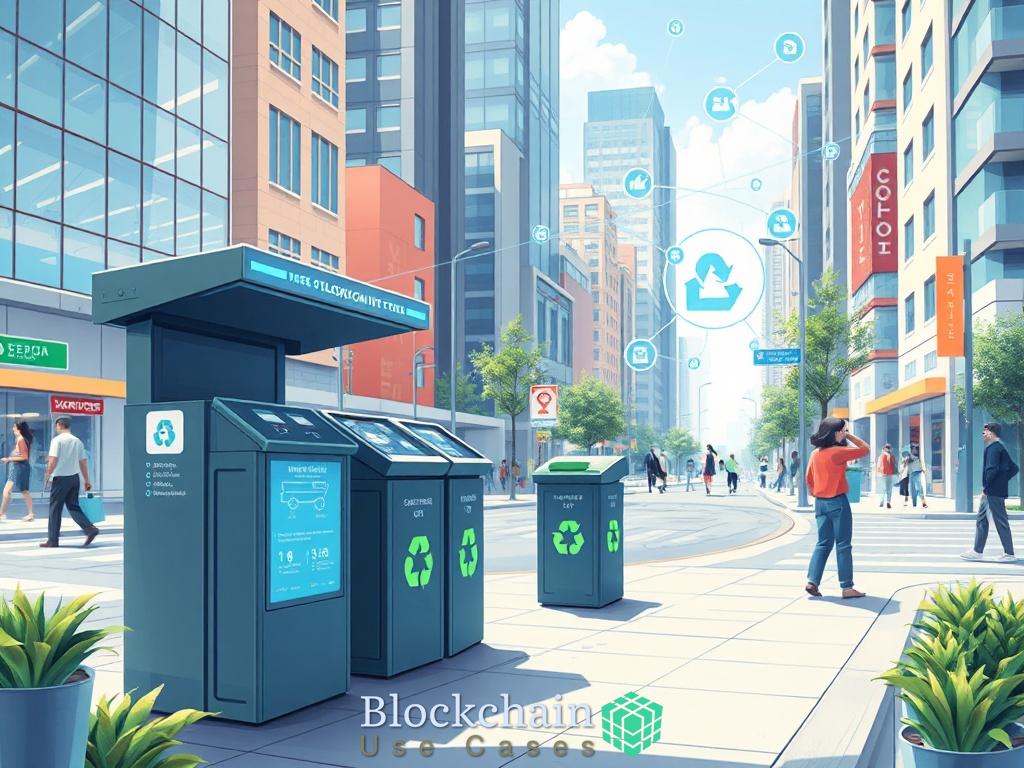Blockchain Integration for Waste Management

The Promise of Blockchain in Waste Management
In the face of growing urbanization and the resulting waste management challenges, innovative solutions are required to improve efficiency and transparency in waste collection and sorting. One such solution is the integration of blockchain technology, which offers a decentralized framework that can enhance the management of IoT-based smart waste systems. By leveraging blockchain, stakeholders can ensure that data related to waste management is secure, immutable, and easily accessible, leading to improved decision-making.
Transforming Waste Collection Processes
Blockchain technology can revolutionize waste collection processes by providing real-time data on waste generation and collection schedules. As IoT devices are deployed in waste bins to monitor fill levels, this data can be logged onto a blockchain. The benefits of this integration are multifaceted:
- Enhanced Transparency: All transactions regarding waste collection can be recorded on a public ledger, ensuring that stakeholders can verify and audit processes.
- Accountability: Smart contracts can be established to automate payments to waste collection companies based on verified collection data, reducing disputes.
- Optimized Routes: Real-time data can facilitate the development of more efficient collection routes, minimizing fuel consumption and operational costs.
Empowering Waste Sorting with Blockchain
Beyond collection, blockchain can also play a pivotal role in the sorting of waste. By tracking the lifecycle of materials through a decentralized system, it becomes easier to monitor recycling processes and ensure compliance with environmental regulations. The following table illustrates key aspects of how blockchain enhances waste sorting:
| Aspect | Traditional Systems | Blockchain-Enabled Systems |
|---|---|---|
| Data Integrity | Vulnerable to manipulation | Immutable and secure |
| Traceability | Limited visibility | Full transparency |
| Efficiency | Manual tracking | Automated smart contracts |
As cities move toward more sustainable waste management practices, integrating blockchain technology presents a compelling opportunity to create a more efficient, transparent, and accountable system. This integration not only benefits waste management companies but also empowers citizens and policymakers to make informed decisions that can lead to a cleaner and greener environment.
IoT Sensors for Smart Waste Monitoring
In the quest for a cleaner and more sustainable environment, the integration of IoT sensors into smart waste management systems is proving to be a game-changer. These sensors enable real-time monitoring of waste levels, providing municipalities and waste management companies with critical data to optimize their operations. By leveraging this technology within a decentralized framework, stakeholders can achieve unprecedented levels of efficiency and transparency, ultimately transforming the waste management landscape.
Empowering Decision-Making with Real-Time Data
IoT sensors placed in waste bins serve as the eyes and ears of smart waste management, collecting vital information about fill levels, temperature, and even the type of waste deposited. This data is not only valuable for immediate operational decisions but also plays a crucial role in long-term planning. With real-time analytics, waste collection schedules can be adjusted dynamically, leading to reduced operational costs and enhanced service delivery.
Advantages of IoT Sensors in Waste Management
Implementing IoT sensors offers a myriad of benefits that contribute to a more efficient waste management ecosystem. Below is a summary of the key advantages:
- Improved Resource Allocation: IoT sensors provide insights into when and where waste bins are nearing capacity, allowing for optimized collection routes and reduced fuel consumption.
- Enhanced Recycling Rates: By monitoring the types of waste being disposed of, municipalities can tailor their recycling programs, educate citizens on proper waste segregation, and increase overall recycling rates.
- Data-Driven Policy Making: Access to comprehensive data allows policymakers to develop targeted strategies to combat waste issues, ensuring resources are allocated where they are needed most.
- Community Engagement: IoT-enabled waste monitoring systems can promote community involvement by providing citizens with feedback on their waste disposal habits, fostering a culture of sustainability.
Future-Proofing Waste Management with IoT
The synergy between IoT sensors and decentralized systems not only enhances current waste management practices but also sets the stage for future innovations. As technology advances, the potential for integrating artificial intelligence and machine learning with IoT data will further revolutionize waste management. This will enable predictive analytics for waste generation, helping cities anticipate trends and adapt their strategies accordingly. Ultimately, the incorporation of IoT sensors in smart waste monitoring represents a significant step toward sustainable urban living, promising cleaner cities and a healthier planet.
Data Analytics for Waste Sorting Optimization
The intersection of data analytics and decentralized systems is poised to reshape the landscape of waste sorting optimization. With IoT devices collecting vast amounts of data in real-time, the ability to analyze this information can lead to profound enhancements in waste management practices. By utilizing advanced analytical techniques, stakeholders can not only improve the efficiency of sorting processes but can also drive higher rates of recycling and waste diversion.
Leveraging Data Insights for Enhanced Sorting Accuracy
Data analytics serves as a critical backbone in the optimization of waste sorting operations. By aggregating data from IoT sensors, waste management companies can gain insights into the composition and volume of waste being generated across different locations. This awareness enables more targeted sorting strategies that can adapt to the specific waste profiles of communities.
Key Benefits of Data-Driven Sorting Techniques
Utilizing data analytics for waste sorting can yield several key advantages, transforming the efficiency of waste management systems:
- Improved Sorting Precision: By analyzing data on waste composition trends, waste sorting facilities can deploy specialized equipment tailored to handle specific materials more effectively.
- Real-Time Adjustments: The ability to monitor waste types and quantities in real-time allows for dynamic adjustments in sorting protocols, ensuring that recyclable materials are processed promptly.
- Predictive Analytics: Employing machine learning algorithms can provide forecasts on waste generation patterns, enabling proactive adjustments in sorting methods and resource allocation.
Data Visualization: A Game-Changer for Decision-Making
Data visualization tools can significantly enhance the interpretability of complex datasets. By presenting waste analytics in visually accessible formats, stakeholders can quickly identify trends and inefficiencies in the sorting process. For instance, the following table summarizes the performance metrics of traditional sorting methods versus data-optimized systems:
| Performance Metric | Traditional Sorting Methods | Data-Optimized Systems |
|---|---|---|
| Sorting Accuracy | 70% | 90% |
| Processing Time | 3 hours | 1.5 hours |
| Recycling Rate | 30% | 55% |
As illustrated, the integration of data analytics into waste sorting processes not only enhances accuracy and efficiency but also leads to a substantial increase in recycling rates. The future of waste management lies in the ability to harness data effectively, ensuring that cities can transition toward more sustainable practices that benefit both the environment and local communities.
User Participation in Decentralized Waste Systems
As cities evolve into smarter, more sustainable environments, the role of community engagement in decentralized waste management systems becomes paramount. The integration of IoT technologies within these systems not only facilitates efficient waste collection and sorting but also empowers citizens to take an active role in environmental stewardship. By fostering user participation, stakeholders can create a more responsive and effective waste management ecosystem that benefits everyone.
User involvement in decentralized waste systems is not merely an add-on; it is a critical component that enhances the overall effectiveness of smart waste management. When individuals feel a sense of ownership over their waste disposal practices, they are more likely to engage in responsible recycling behaviors and provide valuable feedback on local waste management services. This participatory approach ensures that the data collected through IoT devices reflects the actual waste generation patterns and preferences of the community.
Empowerment Through Transparent Communication
One of the most significant advantages of decentralized waste systems is their capacity for transparent communication between municipalities and residents. With the aid of mobile applications linked to IoT sensors, users can receive real-time updates on waste collection schedules and alerts about contamination in recycling bins. This level of transparency not only informs citizens but also encourages them to report issues, such as overflowing bins or inappropriate waste disposal, thereby fostering a collaborative environment focused on sustainability.
Moreover, educational initiatives can be built around these communication channels, allowing municipalities to share best practices for waste segregation and recycling. By providing communities with the right tools and knowledge, they become active participants in the waste management process rather than passive recipients of services.
Data-Driven Insights for Community Engagement
The integration of data analytics within decentralized waste systems enables municipalities to tailor their strategies based on community input. By analyzing data collected from IoT sensors and user interactions, stakeholders can identify trends in waste disposal habits and recycling rates. This analysis can inform targeted initiatives designed to address specific community needs, such as increasing recycling education in areas with lower participation rates.
In addition, the use of gamification techniques within waste management applications can further stimulate user engagement. By incentivizing recycling behaviors through rewards and community competitions, residents are encouraged to take part in sustainable practices actively. In this way, user participation transcends mere compliance and evolves into a culture of sustainability where individuals feel motivated to contribute positively to their environment.
| Metric | Traditional System | Decentralized System |
|---|---|---|
| User Engagement Level | Low | High |
| Feedback Response Time | Monthly | Real-time |
| Recycling Participation Rate | 30% | 60% |
As demonstrated in the table, the shift towards decentralized waste management systems significantly enhances user engagement and participation rates. By valuing community input and creating platforms for interaction, municipalities can ensure a more effective and sustainable waste management process.
Sustainability Metrics in Smart Waste Solutions
As urban areas grapple with escalating waste management challenges, the adoption of decentralized systems integrated with IoT technologies emerges as a beacon of hope for sustainability. The implementation of these systems not only enhances operational efficiency but also provides a framework for measuring sustainability metrics that can drive continuous improvement. By focusing on these metrics, municipalities can assess the effectiveness of their smart waste solutions and ensure that they are contributing positively to environmental goals.
Understanding Sustainability Metrics in the context of smart waste solutions involves evaluating various dimensions such as resource efficiency, environmental impact, and community engagement. Each of these metrics plays a crucial role in creating a balanced approach to waste management that aligns with broader sustainability objectives. For instance, by monitoring the volume of waste diverted from landfills through IoT-enabled sorting systems, municipalities can quantify their progress towards reducing landfill dependency, thereby promoting a circular economy.
Resource Efficiency is a cornerstone of sustainable waste management. The integration of IoT sensors allows for real-time tracking of waste levels, leading to optimized collection routes that minimize fuel consumption and operational costs. This efficiency not only reduces the carbon footprint associated with waste collection but also maximizes resource allocation, ensuring that labor and equipment are utilized effectively. Moreover, by analyzing data on waste generation patterns, cities can identify opportunities to minimize waste at the source, thus fostering a culture of sustainability that extends beyond mere disposal.
In addition to resource efficiency, measuring environmental impact is essential. This involves assessing the reduction in greenhouse gas emissions attributed to optimized collection processes and increased recycling rates facilitated by IoT-enabled sorting technologies. Tracking the lifecycle of materials through decentralized systems further enhances transparency and compliance with environmental regulations. By presenting comprehensive metrics to stakeholders, municipalities can effectively communicate their environmental stewardship efforts and inspire collective action among citizens.
Lastly, community engagement metrics are vital in evaluating the success of decentralized waste management systems. Engaging the public through mobile applications and educational initiatives fosters a sense of ownership and responsibility towards waste management. By analyzing user participation rates and feedback mechanisms, municipalities can refine their strategies to address community needs effectively. The empowerment of citizens not only enhances recycling rates but also cultivates a culture of sustainability that resonates across neighborhoods.
In conclusion, the focus on sustainability metrics within decentralized systems for managing IoT-based smart waste collection and sorting is crucial for creating effective and accountable waste management practices. By embracing a comprehensive approach that incorporates resource efficiency, environmental impact, and community engagement, municipalities can pave the way for a sustainable future, transforming waste management from a challenge into an opportunity for positive change.





